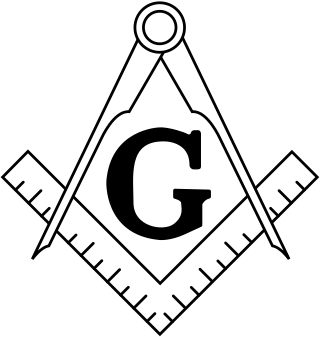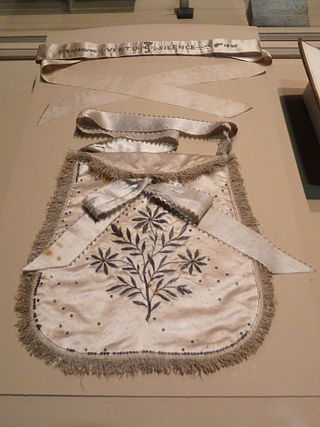
Freemasonry, sometimes spelled Free-Masonry or simply Masonry from 'freestone mason', refers to various fraternal organisations that trace their origins to the local guilds of stonemasons that, from the end of the 14th century, regulated the qualifications of stonemasons and their interaction with authorities and clients. Freemasonry is the oldest fraternity in the world and among the oldest continued organizations in history.
The history of Freemasonry encompasses the origins, evolution and defining events of the fraternal organisation known as Freemasonry. It covers three phases. Firstly, the emergence of organised lodges of operative masons during the Middle Ages, then the admission of lay members as "accepted" or "speculative" masons, and finally the evolution of purely speculative lodges, and the emergence of Grand Lodges to govern them. The watershed in this process is generally taken to be the formation of the first Grand Lodge in London in 1717. The two difficulties facing historians are the paucity of written material, even down to the 19th century, and the misinformation generated by masons and non-masons alike from the earliest years.
In Freemasonry, regularity is one of the factors by which individual Grand Lodges judge whether to recognise one another for the purposes of allowing formal interaction at the Grand Lodge level and visitation by members of other jurisdictions. Each individual Grand Lodge determines which other Grand Lodges it considers Regular.

The Grand Orient de France (GODF) is the oldest and largest of several Freemasonic organizations based in France and is the oldest in Continental Europe. The Grand Orient de France is generally regarded as the "mother lodge" of Continental Freemasonry.

Freemasonry in Malta has a lengthy history dating from the eighteenth century. The main masonic influences have been from the United Grand Lodge of England, the Grand Lodge of Scotland, and the Grand Lodge of Ireland. Today Regular Freemasonry is under the jurisdiction of the English Constitution since 1815, the Sovereign Grand Lodge of Malta, which was formed in 2004 as well as the Grand Lodge of Scotland.
A Grand Lodge, also called Grand Orient or by another similar title, is the overarching governing body of a fraternal or other similarly organized group in a given area, usually a city, state, or country.
The Grande Loge Nationale Française (GLNF) is a French Masonic Grand Lodge. It was founded in 1913, by two lodges, "Le Centre des Amis" Lodge splitting from Grand Orient de France and "L'Anglaise" lodge, an independent lodge based in Bordeaux. GLNF is based on monotheism and the 1929 precepts of regularity issued by the United Grand Lodge of England.
This is a general survey on the historical and modern presence of Freemasonry in countries located in Asia.

Freemasonry has had a complex relationship with women for centuries. A few women were involved in Freemasonry before the 18th century, despite de jure prohibitions in the Premier Grand Lodge of England.
Arcangelo Ghisleri was an Italian geographer, writer, and Socialist politician.
Continental Freemasonry, otherwise known as Liberal Freemasonry, Latin Freemasonry, and Adogmatic Freemasonry, includes the Masonic lodges, primarily on the European continent, that recognize the Grand Orient de France (GOdF) or belong to CLIPSAS, SIMPA, CIMAS, COMAM, CATENA, GLUA, or any of various other international organizations of Liberal, i.e., Continental Freemasonry. The larger number of Freemasons, most of whom live in the United States–where Regular Freemasonry holds a virtual monopoly–belong to Masonic lodges that recognize the United Grand Lodge of England and do not recognize Continental Freemasons, regarding them as "irregular".

Masonic ritual is the scripted words and actions that are spoken or performed during the degree work in a Masonic lodge. Masonic symbolism is that which is used to illustrate the principles which Freemasonry espouses. Masonic ritual has appeared in a number of contexts within literature including in "The Man Who Would Be King", by Rudyard Kipling, and War and Peace, by Leo Tolstoy.
With 84 lodges and 3’350 members, the Grand Lodge Alpina of Switzerland (GLAS) is a Swiss Masonic obedience founded in 1844.
Continental Freemasonry in North America is relatively rare, but there are a few continental-style organizations active.
The first known Freemasons in Portugal were the Swiss John Coustos and two other Portuguese members of his lodge, who were arrested by the Portuguese Inquisition and questioned under torture in the 1740s. Coustos wrote a book detailing his sufferings under the Inquisition and pointed to 1728 as being the year of the first Lodge, although nothing is known of the first years of this Lodge and it was not then recognised by the Grand Lodge of England. Today there are several Masonic Obediences in Portugal.

The Grand Lodge of Cyprus, or in the Greek language, Μεγάλη Στοά της Κύπρου, is the sovereign governing body of freemasonry within the Republic of Cyprus. Its formal English name is "The Most Worshipful Grand Lodge of Cyprus, Ancient Free and Accepted Masons." While four of its constituent lodges are approaching 100 years of age, the Grand Lodge of Cyprus itself came into being on February 15, 2006. Thus it is one of the youngest grand lodges in the world.
Freemasonry in Italy dates to the first half of the eighteenth century. Its success largely depended on the lack of enthusiasm with which Papal bans on the order were enforced in the various states. After the end of the Napoleonic regime, Freemasonry was suppressed in most of the peninsula. The start of the unification process in 1859 saw a revival in Freemasonry. Giuseppe Garibaldi, a leader of Italian unification, was an active Mason and a keen supporter of the craft. In the 1920s, Freemasonry was again suppressed under Italian fascism but revived again after the fall of Benito Mussolini. Into the 21st century, Italy contains a wide variety of Masonic observances, regular, liberal, male, female and mixed.

The Grand Lodge of Macedonia is a Grand Lodge for Freemasonry in the Republic of North Macedonia. Founded in 2005 by the United Grand Lodge of England, it is the only Regular Masonic jurisdiction in North Macedonia.

The Lectures of the Three Degrees in Craft Masonry is a series of manuals on Freemasonry that are arranged in the form of catechisms to be memorized. They cover rituals and symbolism associated with the three degrees of Craft Freemasonry in question and answer form. During the second half of the 19th century, the Lectures gradually ceased to be used regularly in English Lodges.










